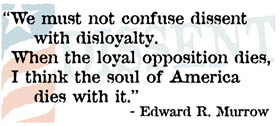

On this page:
Quotes about Patriotism
A Teen's Perspective
 On Patriotism
On Patriotism"It is the duty of the patriot to protect his country from the government." - Thomas Paine
"A President is impeachable if he attempts to subvert the Constitution." - President James Madison
"They that can give up essential liberty to obtain a little temporary safety deserve neither." - Ben Franklin
"If ever time should come, when vain and aspiring men shall possess the highest seats in government, our country will stand in need of its experienced patriots to prevent its ruin." - Samuel Adams
"The only thing necessary for the triumph of evil is for good men to do nothing." - Edmund Burke
"This country, with its institutions, belongs to the people who inhabit it. Whenever they shall grow weary of the existing government, they can exercise their constitutional right of amending it, or exercise their revolutionary right to overthrow it."
- President Abraham Lincoln
 "In the beginning of a change, the patriot is a scarce and brave man, hated and scorned. When his cause succeeds however, the timid join him, for then it costs nothing to be a patriot." - Mark Twain
"In the beginning of a change, the patriot is a scarce and brave man, hated and scorned. When his cause succeeds however, the timid join him, for then it costs nothing to be a patriot." - Mark Twain
"Patriotism means to stand by the country. It does not mean to stand by the President." - President Theodore Roosevelt
"The President is merely the most important among a large number of public servants. He should be supported or opposed exactly to the degree which is warranted by his good conduct or bad conduct, his efficiency or inefficiency in rendering loyal, able, and disinterested service to the nation as a whole. Therefore it is absolutely necessary that there should be full liberty to tell the truth about his acts, and this means that it is exactly as necessary to blame him when he does wrong as to praise him when he does right. Any other attitude in an American citizen is both base and servile. To announce that there must be no criticism of the President, or that we are to stand by the President, right or wrong, is not only unpatriotic and servile, but is morally treasonable to the American public. Nothing but the truth should be spoken about him or any one else. But it is even more important to tell the truth, pleasant or unpleasant, about him than about any one else." - President Theodore Roosevelt, 1912
"I love America more than any other country in this world, and, exactly for this reason, I insist on the right to criticize her perpetually." - James Baldwin, "Notes of a Native Son"
"So long as we have enough people in this country willing to fight for their rights, we'll be called a democracy." - Roger Baldwin
"Disobedience, in the eyes of any one who has read history, is man's original virtue. It is through disobedience that progress has been made, through disobedience and through rebellion." - Oscar Wilde
"Liberty means responsibility. That is why most men dread it." - George Bernard Shaw
"As democracy is perfected, the office of president represents, more and more closely, the inner soul of the people. On some great and glorious day the plain folks of the land will reach their heart's desire at last and the White House will be adorned by a downright moron." - H.L. Mencken (1880 - 1956)
"The ultimate measure of a man is not where he stands in moments of comfort, and convenience, but where he stands at times of challenge and controversy." - Dr. Martin Luther King
"Throughout history, it has been the inaction of those who could have acted; the indifference of those who should have known better; the silence of the voice of justice when it mattered most; that has made it possible for evil to triumph." - Haile Selassie
"Our lives begin to end the day we become silent about things that matter." - Reverend Martin Luther King Jr.
"A time comes when silence is betrayal. Even when pressed by the demands of inner truth, men do not easily assume the task of opposing their government's policy, especially in time of war. Nor does the human spirit move without great difficulty against all the apathy of conformist thought, within one's own bosom and in the surrounding world." - Martin Luther King Jr.
 Another Patriotism
Another PatriotismMuch has changed here in the United States since 9/11. Those of us who travel by air now experience warnings about rising “terror alert” levels and routine delays. Sentiments of patriotism have increased; American flags have sprouted from many previously unadorned businesses and homes. These same effects are evident in the high school from which I graduated last June; the Pledge of Allegiance, once a perfunctory gesture to tradition, is now recited daily with feeling and conviction.
Linked with this rise in national pride, I have noticed what I feel to be an insidious trend: the military’s recruitment of high school students by playing on the emotions of fear and patriotism, touting the armed forces as the best way to serve our country.
Every day I attended high school I saw the armed forces’ influence, from extensive advertising campaigns to in-school recruitment, targeting kids in their most malleable stage of life. On a daily national television news program for students, shown throughout the school, close to one third of the advertising time is dedicated to various branches of the armed forces. Showing well-built men performing daring tests of physical stamina and participating in exciting training events, these ads play directly on teenagers’ desire for excitement and for approval by their peers, especially with regards to physical capabilities.
 In an even more direct incursion into the school, various branches of the military conduct physical education classes once a semester. These “guest instructors” put students through a series of exercises and physical activities at various stations around the gym, having the students scream as they run from activity to activity. At one such station, a pair of punch bags, students are “encouraged” with language for which they themselves could receive a suspension. Kids have been known to continue to the point of vomiting rather than face the comments and embarrassment that would result from taking a rest. Others, however, gloried in the chance to show off their stamina and have it recognized with a key chain presented in front of the entire class. Those who, like myself, object to participation because of their beliefs, must sit out and receive a zero grade for the day.
In an even more direct incursion into the school, various branches of the military conduct physical education classes once a semester. These “guest instructors” put students through a series of exercises and physical activities at various stations around the gym, having the students scream as they run from activity to activity. At one such station, a pair of punch bags, students are “encouraged” with language for which they themselves could receive a suspension. Kids have been known to continue to the point of vomiting rather than face the comments and embarrassment that would result from taking a rest. Others, however, gloried in the chance to show off their stamina and have it recognized with a key chain presented in front of the entire class. Those who, like myself, object to participation because of their beliefs, must sit out and receive a zero grade for the day.
Even if a student refuses to give his personal information to the armed forces, it is not guaranteed to remain private. The military can obtain the name, phone number, and address of any graduating senior unless they request otherwise in writing during the first three weeks of the school year. Students at my school are informed of this right in two lines on page 33 of the student handbook; not surprisingly, most students remain ignorant of their rights.
Because I live in an area with high poverty, the military’s provisions for further education make the armed forces seem like many students’ only possible source of funds for attending college. These “volunteers” are rarely fully informed concerning the likelihood that they will be sent into combat or called up as reserves after their initial service is over. Of course, these financially motivated volunteers come disproportionately from low-income families.
All the above points have been raised numerous times by various groups opposed to military recruitment in schools, but those to whom they most pertain—my peers—generally remain in complete ignorance of them, subliminally absorbing the barrage of pro-military advertising that assails them every day.
Yet although these intrusive recruiting techniques disturb me, they also bring a certain inspiration: could not the same battle-proven combination of television spots, posters, and educational incentives be used to inspire teens to serve their country, but not to kill?
The lessons taught by true service to others are far more essential to the survival of America than the lessons of war taught in the armed forces. Every hour I have spent as a volunteer interacting with the elderly or tutoring elementary students has taught me more than the equivalent time spent in school.
A small group of individuals determined to fight drunk driving or drug abuse could save more lives than any counter-terrorist action could hope to save. A teen effort to provide food to starving children worldwide might improve the world’s view of America, and would serve to undermine the popular anti-American views that fuel terrorism in a much cheaper and more effective manner than any amount of munitions. These are the types of service so badly lacking among those of my generation, the types of service into which our government should channel patriotic energy, rather than into the destruction caused by war.
I highly doubt that anyone with any weight in the government or armed forces will hear of my suggestion to recruit teens to service instead of war, let alone listen to it. It is therefore our responsibility as Americans to do what we can to change the current program of military might and intense recruitment into a service of love and humanity. It is not enough just to say, “I oppose killing in war”; we must represent our opposition as positive energy through our daily actions. We must not condemn those willing to die for what they see as the good of our country, but join them by demonstrating that another kind of patriotism rests in offering enthusiastic service to help make America and the rest of the world a safer, happier, and better place.
This essay was originally posted at Bruderhof.com
Get informed about the impending reinstatement of the military draft and write your elected officials. Click here for more information.